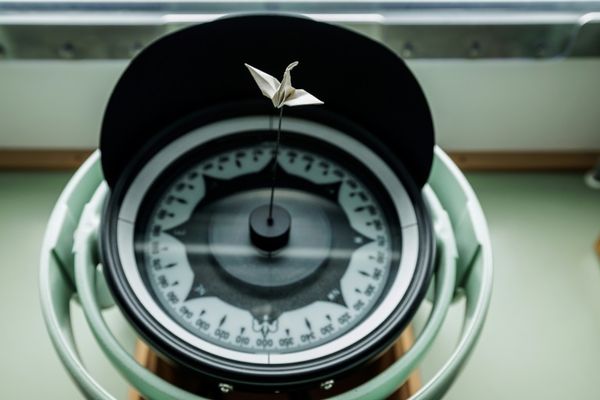
The poet Pierre Quillard, defending the symbolist performance of his play The Girl With the Severed Hands (premiered in Paris in 1891), described theatre as “an excuse to dream” – not as a way to escape reality but to experience it more fully in its extraordinary intensity.
La Manékine, by French puppet company La Pendue, opening the fortnight-long MimeLondon festival, is rooted in the same folk tale as Quillard’s play but adapted from the Brothers Grimm version of it (which also formed the basis of Kneehigh theatre’s 2011 The Wild Bride, and Sébastien Laudenbach’s haunting 2016 animated feature film The Young Girl Without Hands).
A screen forms the backdrop to the small stage. Sometimes projections accompany the action – a mixture of drawings, photos, animation, film, in muted tones. Two performers deliver the story. On drums, accordion, clarinet, whistle – up to three at a time – Martin Kaspar Orkestar plays music he has composed; occasionally, he dons a character mask and joins the action. Estelle Charlier narrates the story in the role of a king’s gardener, plays masked characters (sometimes two or three simultaneously), manipulates mannequins (glove-puppet-tiny to lifesize) and rearranges set, props and costumes (she is also credited with the overall concept and artistic direction). Sometimes the two sing together – wild harmonies that seem to come from somewhere else, not here, not now.
In this place, a miller accidentally sells his daughter to the devil then must cut off her hands when she finds a way to defeat the demon; a king marries a penniless stranger; an angel speaks to God via mobile phone… and all will be well if people act in good faith, springing from love.
Romaric Sangars’s text is not poetry, in Quillard’s sense, but it has the quality of simplicity (not simple to achieve) shared by all the vividly various elements of the production. As in a dream, these combine in a way that, although utterly strange, connects us to the intangible realities of existence.
• La Pendue: La Manékine is at the Pit, Barbican, London, until 18 January







